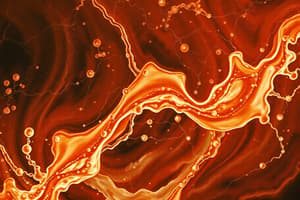Podcast
Questions and Answers
What is the primary use of Imferon?
What is the primary use of Imferon?
- To treat severe iron deficiency anemia when oral therapy is ineffective (correct)
- To treat mild iron deficiency anemia
- To supplement dietary iron intake
- To enhance exercise performance
What are the components of Iron Sorbitex injection?
What are the components of Iron Sorbitex injection?
- Iron, sorbitol, and citric acid (correct)
- Iron, glucose, and citric acid
- Iron, starch, and water
- Iron, dextrin, and polyethylene glycol
Why are copper supplements generally considered unnecessary for most people?
Why are copper supplements generally considered unnecessary for most people?
- Copper is overly abundant in the environment
- Copper absorption occurs only in the intestines
- Most people obtain sufficient copper from food and other sources (correct)
- High levels of copper are toxic to humans
What is the primary action of deferoxamine when administered parenterally?
What is the primary action of deferoxamine when administered parenterally?
Which of the following is a key role of copper in the body?
Which of the following is a key role of copper in the body?
What is the pH range for Imferon prior to mixing?
What is the pH range for Imferon prior to mixing?
Which of the following iron salts is considered the drug of choice for treating uncomplicated iron deficiency anemia?
Which of the following iron salts is considered the drug of choice for treating uncomplicated iron deficiency anemia?
Where is copper primarily found in the adult human body?
Where is copper primarily found in the adult human body?
What is the typical administration route for deferoxamine mesylate?
What is the typical administration route for deferoxamine mesylate?
What commonly occurs when orally administered iron is taken with tetracycline?
What commonly occurs when orally administered iron is taken with tetracycline?
What is a significant consequence of the concurrent administration of oral iron with Iron Sorbitex injection?
What is a significant consequence of the concurrent administration of oral iron with Iron Sorbitex injection?
What is a major disadvantage of ferrous sulfate when taken orally?
What is a major disadvantage of ferrous sulfate when taken orally?
How does copper assist in oxidative phosphorylation?
How does copper assist in oxidative phosphorylation?
What is a common cause of anemia due to excessive blood loss?
What is a common cause of anemia due to excessive blood loss?
Which iron compound is commonly used for iron replacement therapy?
Which iron compound is commonly used for iron replacement therapy?
What is a characteristic of ferrous fumarate compared to ferrous sulfate?
What is a characteristic of ferrous fumarate compared to ferrous sulfate?
Which iron salt has a good bioavailability and is often used in iron supplementation?
Which iron salt has a good bioavailability and is often used in iron supplementation?
What is considered the human lethal dose of iron?
What is considered the human lethal dose of iron?
In which stages of iron poisoning might a patient experience cardiovascular collapse?
In which stages of iron poisoning might a patient experience cardiovascular collapse?
What is the usual dose of ferrous fumarate for iron supplementation?
What is the usual dose of ferrous fumarate for iron supplementation?
Which of the following is a treatment for iron poisoning?
Which of the following is a treatment for iron poisoning?
What can excessive iron ingestion lead to shortly after consumption?
What can excessive iron ingestion lead to shortly after consumption?
What condition indicates a defect in iron absorption that warrants parenteral iron preparations?
What condition indicates a defect in iron absorption that warrants parenteral iron preparations?
What adverse effect can result from overdosing on oral iron?
What adverse effect can result from overdosing on oral iron?
What is the primary function of iron in the blood system?
What is the primary function of iron in the blood system?
Which statement correctly describes ferritin?
Which statement correctly describes ferritin?
Which of the following is considered a major transport protein for iron in blood plasma?
Which of the following is considered a major transport protein for iron in blood plasma?
What happens to the absorption of iron when erythropoiesis is stimulated?
What happens to the absorption of iron when erythropoiesis is stimulated?
Which type of iron is primarily found in heme for oxygen transport?
Which type of iron is primarily found in heme for oxygen transport?
What is a characteristic of hemosiderin compared to ferritin?
What is a characteristic of hemosiderin compared to ferritin?
What condition results from deficient circulating red blood cells or low hemoglobin content?
What condition results from deficient circulating red blood cells or low hemoglobin content?
Which of these factors facilitates iron transport into the intestinal mucosa?
Which of these factors facilitates iron transport into the intestinal mucosa?
What is a role of copper in the body related to elastin?
What is a role of copper in the body related to elastin?
What condition is characterized by a genetic origin and excess copper storage?
What condition is characterized by a genetic origin and excess copper storage?
Which enzyme requires copper as a component and is involved in pigment production?
Which enzyme requires copper as a component and is involved in pigment production?
Which of the following food sources is richest in zinc?
Which of the following food sources is richest in zinc?
What is a consequence of zinc deficiency in the body?
What is a consequence of zinc deficiency in the body?
What is the primary function of selenium in the body?
What is the primary function of selenium in the body?
Which of the following is NOT a symptom or sign of low plasma zinc levels?
Which of the following is NOT a symptom or sign of low plasma zinc levels?
Which of the following drugs is used as a chelating agent for Wilson disease?
Which of the following drugs is used as a chelating agent for Wilson disease?
Flashcards are hidden until you start studying
Study Notes
Iron
- Essential for metabolic processes in the cell
- Acts as an electron carrier in the respiratory chain
- Responsible for transporting oxygen, especially in higher organisms
- Functions via coordination compounds in different oxidation states and bonding
- Found in various forms depending on its role:
- Hemoglobin: O2 transport
- Plasma: Fe transport
- Tissue: Cell respiration and storage
Hemoglobin
- Consists of four protein chains, each containing a heme unit with a porphyrin ring and ferrous iron
- Ferrous iron is crucial for oxygen binding
Ferritin and Hemosiderin
- Iron storage proteins found in the liver, spleen, and bone marrow
- Ferritin: Water soluble, crystallizable, stores iron in Fe+3 form but incorporates and releases in Fe+2 form
- Hemosiderin: Water insoluble, considered a dehydrated form of ferritin
Transferrin
- Major iron transport protein in blood plasma
- A glycoprotein
Iron Absorption
- Facilitated by ascorbic acid, fructose, and other organic molecules
- Intestinal response to iron depletion is faster when erythropoiesis (RBC production) is stimulated
- Transferrin depletion during RBC formation signals the intestine to absorb more iron
Anemia
- Deficiency in circulating red blood cells or hemoglobin content
- Leads to lower oxygen carrying capacity
- Caused by:
- Excessive blood loss (e.g., ulcers, hemorrhaging, menstrual flow)
- Blood destruction (e.g., drugs, infections, toxins, defective hemoglobins)
- Decreased blood formation (e.g., nutritional deficiencies, infections, renal insufficiency)
Iron Replacement Therapy
- Requirements:
- Biological availability (water soluble)
- Non-irritant
- Ferrous sulfate is considered the standard
- Sustained release formulations minimize irritation
- Parenteral iron preparations are indicated for:
- Iron absorption defects
- Iron salt irritation in the gastrointestinal tract
Iron Poisoning
- Can be serious and even lethal, especially in children
- Lethal dose: 150-200 mg iron/kg body weight
- Progresses in stages:
- Stage 1: Gastrointestinal distress, cardiovascular collapse
- Stage 2: Apparent recovery
- Stage 3: Recurring cardiovascular collapse, convulsions, liver damage
- Stage 4: Gastrointestinal complications
Iron Poisoning Treatment
- Gastric lavage
- Administration of salts to form insoluble iron salts
- Oral deferoxamine to prevent iron absorption
- Parenteral deferoxamine to chelate and excrete iron
- Peritoneal dialysis (limited success)
Iron Interactions
- Interferes with tetracycline absorption
- Oral ferrous salts may aggravate gastrointestinal diseases
Official Iron Products
- Ferrous sulfate:
- Most widely used
- Drug of choice for uncomplicated iron deficiency anemia
- Can be irritating to the gastrointestinal mucosa
- Usual dose: 300 mg (60 mg elemental iron) two or three times a day
- Ferrous fumarate:
- Resistant to oxidation
- Usual dose: 200 mg (60 mg elemental iron) two or three times a day
- Ferrous gluconate:
- Good bioavailability
- Usual dose: 300 mg (35 mg elemental iron) three times a day
Parenteral Iron Administration
- Iron dextran injection:
- Colloidal solution of ferric hydroxide complexed with dextran
- For intramuscular injection only
- Used for severe iron deficiency anemia when oral therapy is contraindicated
- Usual dose: 100 mg of iron once a day
- Iron sorbitex injection:
- Solution of complex of iron, sorbitol, and citric acid
- For intramuscular injection only
- Usual dose: 100 mg of iron once a day
Copper
- Required for:
- Many enzymes
- Synthesis of hemoglobin
- Normal bone formation
- Most individuals obtain sufficient copper from food, water, and cooking utensils
- Supplementation may not be necessary
- Average daily intake: 2-5 mg
- Found in various forms:
- Ceruloplasmin (liver)
- Cerebrocuprein (brain)
- Erythrocuprein (blood cells)
Copper Functions
- Hemoglobin formation:
- Facilitates iron absorption
- Stimulates enzymes involved in heme and globin biosynthesis
- May play a role in stored iron metabolism
- Oxidative phosphorylation:
- Component of cytochrome oxidase
- Aortic elastin formation:
- Possibly through amine oxidase activity
- Melanin production:
- Component of tyrosinase, responsible for converting tyrosine to melanin
Wilson Disease
- Excess copper storage
- Genetic origin
- Decreased ceruloplasmin concentration, leading to decreased blood copper
- Characterized by:
- High copper in brain, liver, kidney, and cornea
- Excessive urinary copper output
- Treated with penicillamine (chelating agent) and diet restriction
Copper Uses
- Topically as fungicide and astringents
- Antidote for phosphorus poisoning
- Component of Fehling and Benedict solutions (used for glucose determination)
Zinc
- Essential for:
- Enzymes (alcohol dehydrogenase, alkaline phosphatase, carbonic anhydrase, etc.)
- RNA stabilization
- Normal growth and reproduction
- Tissue repair and wound healing
- Insulin complex in pancreatic beta cells
- Vitamin A mobilization from liver and metabolism
Zinc Deficiency
- Found in:
- Alcoholic cirrhosis
- Uremia
- Myocardial infarction
- Cystic fibrosis with growth retardation
Zinc Sources
- Seafood, nuts, meat, eggs, milk
- Plant-based diets may be deficient due to phytic acid binding zinc
Selenium
- Mediates the activity of glutathione peroxidase, an antioxidant enzyme
- Acts as a protective mechanism against oxidative stress
- Important in cellular protection and reducing inflammation
Other Points
- Zinc sulfate is used as a topical astringent
- Phytic acid in plant proteins can bind zinc and decrease its absorption
- The text mentions that ferrous gluconate, while having good bioavailability, may not be less irritating than ferrous fumarate or sulfate when equivalent doses of iron are administered. This is left unanswered as a homework question.
Studying That Suits You
Use AI to generate personalized quizzes and flashcards to suit your learning preferences.




